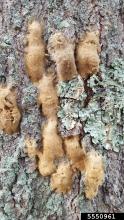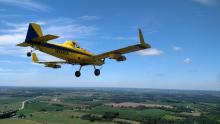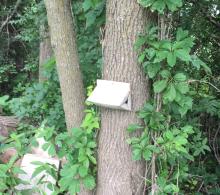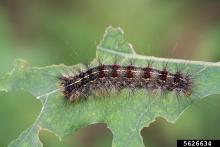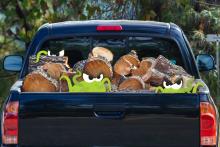Holiday greenery and Christmas trees bring joy throughout the season, but they can also hide dangerous pests. Diseases and invasive species can make their way into our landscapes on trees and boughs brought into Minnesota from other states.
To protect our environment, the State of Minnesota is asking residents to take these steps to properly dispose of greenery and trees after the holiday season:
- The best option is to use a curbside tree collection or bring trees to a designated drop-off site. Check with your waste hauler, city, or county to see what services are offered in your area. The Minnesota Pollution Control Agency has a map of yard waste compost locations; contact locations directly to see if they accept trees and greenery.
- Don’t toss trees and greenery into your backyard woods or residential compost pile, which can spread the invasive species or disease.
- Wreaths and other decorative greens can be disposed of in trash cans.
- If your city or county does not have an organized pick-up or drop-off, the last resort is to burn the greens. Always check fire danger conditions and burning restrictions before burning and follow local ordinances.
Pests of concern include elongate hemlock scale, a small insect established in the eastern U.S. where many decorative Fraser firs are grown. Feeding damage caused by this invasive insect can cause the needles of hemlocks, firs, and spruces to yellow and prematurely drop. Also, boxwood blight, a fungal disease, and round leaf bittersweet, an invasive noxious weed, are sometimes found on wreaths and centerpieces and can endanger native trees and other landscaping.
If you suspect your greenery or tree may be infested with an invasive insect or disease, contact the Minnesota Department of Agriculture’s Report a Pest line at 1-888-545-6684, reportapest@state.mn.us, or through the online reporting form.
###
Media Contact
Brittany Raveill, MDA Communications
651-201-6131
Brittany.Raveill@state.mn.us
FSMA Produce Safety Rule Grower Training - Farmington
4100 220th Street West
Suite 100
Farmington, MN 55024
Who should attend?
This one-day, in-person training course is for produce growers. If your farm is not excluded or exempt from the Food Safety Modernization Act (FSMA) Produce Safety Rule, at least one responsible party from your farm must complete a training that uses FDA-recognized curriculum or equivalent. This course meets those requirements. All produce growers interested in learning about produce safety, Good Agricultural Practices (GAPs) and the Produce Safety Rule are welcome to attend. Contact the MN Department of Agriculture Produce Safety Program to learn if your farm is covered by the rule.
What to Expect: The training will consist of both practical guidance for implementing Good Agricultural Practices as well as the requirements of the Produce Safety Rule. Key topics:
- Requirements of the rule and information to help you meet them
- Potential sources of contamination on the farm and microorganisms of concern
- Water management & testing; worker hygiene; application & use of biological soil amendments
- Practices that reduce risks, and practical methods to implement these practices on the farm
- Your questions on the rule and how it is being implemented in Minnesota
Registration: Includes the training materials, lunch, refreshments, and a Certificate of Course Attendance. Participation for the entire training is required to receive the certificate. Check-in opens at 8:30am, training will begin at 8:45am and end at 5:00pm. Pre-registration is required.
Individuals with a disability who need a reasonable accommodation to participate in this event please contact the Produce Safety Program through the contact info above or through the Minnesota Relay Service at 711 as soon as possible.
Questions? Please contact the Produce Safety Program through the contact info above.
Refunds: Can only be processed up to 21 days prior to the training; tix.com processing fees cannot be refunded.
Funding for this statement and event was made possible, in part, by a Specialty Crop Block Grant and by the Food and Drug Administration through grant PAR-16-137. The views expressed in written materials or publications and by speakers and moderators do not necessarily reflect the official policies of the Department of Health and Human Services; nor does any mention of trade names, commercial practices, or organization imply endorsement by the United States Government.
FSMA Produce Safety Rule Grower Training - Virtual
This training is being offered remotely, via Zoom. In order to participate, individuals must have a web-cam, two-way audio (speakers & microphone), reliable internet, and will be required to have the web-cam on during the full course of the training (8:45am - 5:00pm). This is to verify participants' presence and participation.
Who should attend?
This one-day training course is for produce growers. If your farm is not excluded or exempt from the Food Safety Modernization Act (FSMA) Produce Safety Rule, at least one responsible party from your farm must complete a training that uses FDA-recognized curriculum or equivalent. This course meets those requirements. All produce growers interested in learning about produce safety, Good Agricultural Practices (GAPs) and the Produce Safety Rule are welcome to attend. Contact the MDA Produce Safety Program to learn if your farm is covered by the rule.
What to Expect at the FSMA Produce Safety Rule Training Course
The training will consist of both practical guidance for implementing Good Agricultural Practices as well as the requirements of Produce Safety Rule. Key topics:
- Requirements of the rule and information to help you meet them
- Potential sources of contamination on the farm and microorganisms of concern
- Water management & testing; worker hygiene; application & use of biological soil amendments
- Practices that reduce risks, & practical methods to implement these practices on the farm
- Your questions on the rule and how it is being implemented in MN
Registration:
Registration includes the training materials (mailed to you in advance) and a Certificate of Course Attendance. Participation for the entire training is required to receive the certificate. Check-in opens at 8:30am, training will begin at 8:45am and end at 5:00pm. Class sizes are limited. Only Minnesota produce growers are eligible to register at this time. If you reside outside of Minnesota but are interested in participating, please email us your name and address, and we can notify you if space becomes available.
Individuals with a disability who need a reasonable accommodation to participate in this event please contact the Produce Safety Program through the contact info above or through the Minnesota Relay Service at 711 as soon as possible.
Funding for this statement and event was made possible, in part, by a Specialty Crop Block Grant
The revised Minnesota State Plan, updated to incorporate the federal Final Rule for commercial hemp regulation was approve
